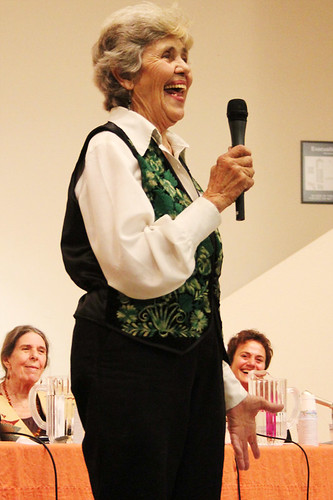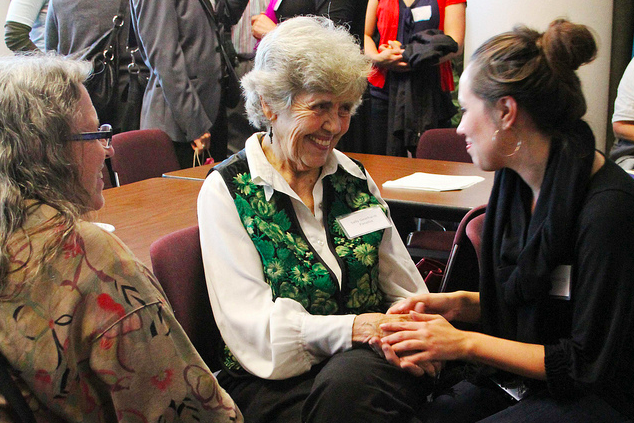
In the tumult of the late 1960s, a clash of movements ranging from faculty strikes to the Native American occupation of the island of Alcatraz sent San Francisco into a whirlwind of change. As part of the aftermath, the SF State women and gender studies department was born.
The program recently turned 40 years old and celebrated its birthday Oct. 28 with a range of events acknowledging its burgeoning history and the curriculum’s impact on students and the Bay Area.
The day-long campus event featured testimonies from faculty, staff and students who built the institution and fostered the development of the program.
“Truly we are here surrounded by inspirational people and trailblazers of the department,” said Kasturi Ray, assistant WGS professor. “It’s one of these days where I feel very, very tall. I’m going to remember this day for the rest of my life.”
The SF State WGS program is one of the oldest in the United States. The first institution to offer curriculum in women’s studies was San Diego State in the fall of 1970.
Women and Gender Studies began at SF State in the spring of 1971 when four courses, offered by three separate departments, enrolled a total of 160 students. In 1976, these classes became an official program recognized by the University administration. The first graduating class consisted of three women in 1977.
The next year’s graduating class consisted of 13 students. Among those was a Robin Song, who spoke at the alumni panel event and acknowledged that the department was born from the heated, larger political context surrounding San Francisco.
“For me, women studies was not a career move, it was a political statement,” Song said. “A lot was happening in the community in 1976 and women were out there in the community in huge waves. In the women studies program, we were out being in the community as well and the program had the two integrated together.”
Song said that the department integrated ideology and a climate of change within the school community.
“We were in the patriarchal institution, and fretted around that a lot. One of the things that we would do was to try change things up,” Song said. “We were very fragile because we were new like a new baby and we were feisty. So we were always looking for new ways to approach things because we really didn’t know and we didn’t know we were going but just wanted to move forward.”
Andrea Rough, who attended the event, found it illuminating that the program had a course 30 years ago called the Politics of Housework.
“There were a number of issues raised that had to do with the past, present, and future with housework,” Rough said. “It was more about aging.”
One of the ways to integrate principles of equality was in the hiring committee, which reviews candidates hired to teach a department’s curriculum.
The hiring committee not only included tenured faculty, as is the norm, but also included lecturers, part-time professors and students.
According to Song each person had equal say in selecting a teacher.
In 1979, Angela Davis, a leader in the Black Panther movement, was selected to teach at SF State, but the administration tried to deny Davis’ hiring. The issue garnered national attention and was featured in “People Magazine.” The program’s hiring committee called in a meeting with University administration.
“I remember our meeting with the administration very well because all of us were there, even the students. We were all sitting around this table and the two administrators walked into the room looked around and said ‘What are these people doing here?’ ‘They are part of the hiring committee!’ we said,” Song recalled. “So he sat down and sat down with his back to us. He would not look at us at all during the whole meeting but we got to keep Angela with us.”
Bonnie Gordon, a WGS graduate from 1982, recalled being in Davis’ first class in 1979.
“I remember going to the classroom and wondering why there was so much police and security. I didn’t know Angela Davis was going to be the teacher and it was exciting to be a part of her class,” Gordon said. “We were living in times of change and we all felt like part of a tight community that kept growing and changing.”
2011 marks not only the beginning of the department but also the 20th anniversary of the master’s program.
Sima Shakhsari, a graduate from the master’s program, said the program changed her way of thinking.
“Back in Iran, I excelled in the quantitative sciences but when I came here I didn’t understand what the hell they were saying in these classes,” Shakhsari said. “I now know how to read better and the skills I’ve learned here at San Francisco State have helped in my teaching career out in Houston.”
Since the initiation of the major, there have been more than 650 students who either graduated with a bachelor, minor or master’s degree.
Nancy McDermid, former chair of the department, said that the history of the department isn’t simply moving forward toward equality but rather building upon the foundations left by those in the past 40 years.
“We stand on the shoulders of others,” McDermid said.
Song concluded that WGS is not just schoolwork but rather a community of family.
“There’s a movement that takes place inside of us when we take women studies and we have this community of women that is life changing,” Song said. “We were telling telling our stories for the first time and we learned how to stand up in all the contradiction in this country.”
There are currently 125 majors, 15 minors and 25 graduate students in the program.
Katherine Yau also contributed to this story







